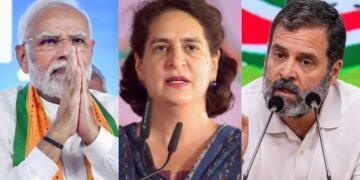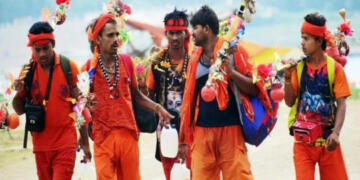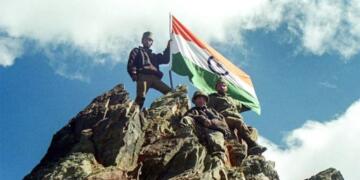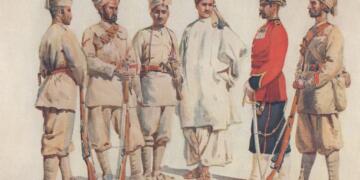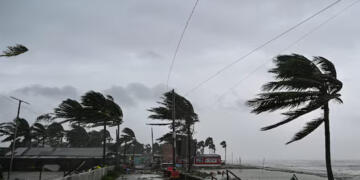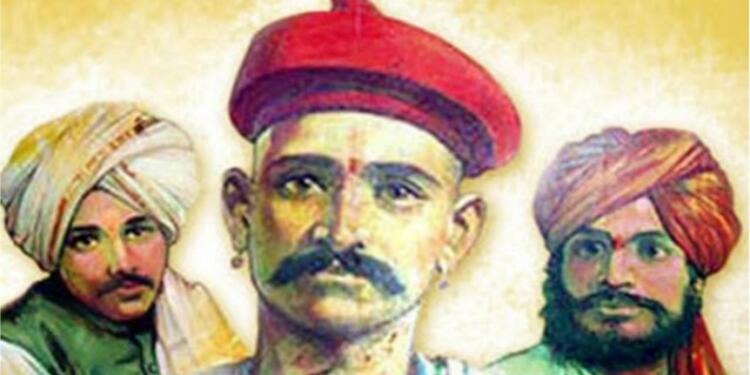If you think that quotes like ‘I’ll be back’ are the stuff of legends, think again. Centuries ago, a clarion call rang throughout the region of Marathwada, that not only rejuvenated the dormant struggle of independence but also brought forward some warriors of unmatched valour and supreme will, whose tales are still unknown to many. 22nd June 2022, was the 125th anniversary of the valour of the Chapekar brothers, whose war against the British imperialism accelerated the fight for Indian independence.
Who were the Chapekar brothers?
This is the tale of the brave and courageous Chapekar brothers, who hailed from Chinchwad, a village near the former Peshwa capital Pune, in the present Indian state of Maharashtra. The eldest of them, Damodar Hari, was born in 1869, whose grandfather, Vinayak Chapekar, was the head of an extended family which consisted of the brothers’ parents, Dwarka and Hari, and about twenty members including six uncles, two aunts, and two grandmothers. The family was wealthy at the time of Damodar’s birth, earlier having had a turnover of lakhs of rupees.
However, with time, mainly on account of Vinayak Chapekar’s independent spirit and ways which made him incapable of submitting himself to government service, and his many unsuccessful business ventures, the family gradually sank into poverty.
Eventually, Vinayak Chapekar left the house for the then Maratha capitals of Indore and Dhar, he worked there as a writer, he had an excellent Balbodh and Modi hand. He subsequently stopped speaking any language but Sanskrit, became careless in dress, stopped interacting with others as much as possible, and started to beg on the streets. Other members of the family faced poverty too and were forced to feed themselves at charity kitchens.
The father and children became proficient in their art and were admired for their work. The Chapekar brothers received little formal education, but the “company of good people, hearing of kirtans, travelling, witnessing darbars of great princes and seeing assemblies of eminent scholars” was a source of knowledge far more enriching than a few examinations passed in school”, writes Damodar Hari in his autobiography. Hari Vinayak, father of the Chapekar brothers is credited to have authored Satyanarayanakatha, of the Skandapurana, a Sanskrit text with translations.
The Plague
By the time the Chapekars had regained prominence in Pune, calamity loomed large. The bubonic plague did not spare India either, claiming at least not less than 5 million lives at that time. The 1890s was the worst time for the nation. Now Pune, being a crucial military base with a large cantonment during the British colonial rule, had a significant European population of soldiers, officers, and their families.
So even as millions of Indians were dying, the British did introduce several public health initiatives, even if just for formality. Several initiatives were undertaken during this period ostensibly to protect the Indian population, but the real intention was to keep Europeans safe from the periodic epidemics of diseases like cholera, bubonic plague, smallpox etc. The action took form of vaccinating the population and better sanitary arrangements and given the vast cultural differences, and at times the arrogance of colonial officers, clashes were bound to rise. These health measures often led to public anger.
The Atrocities of the British
However, the heavy-handedness was particularly bad in 1897, during the bubonic plague epidemic in the city, though there was little to no resistance on the national front. The Indian National Congress, but that was only in name, as they were incapable of providing any resistance to the British, in terms of atrocities against the Indian subjects over the issue of the Bubonic plague.
By the end of February 1897, the epidemic was raging with a mortality rate twice the norm (657 deaths or 0.6% of the city population), and half the city’s population had fled. A Special Plague Committee was formed under the chairmanship of W.C. Rand, an Indian Civil Services officer with a shady record. He brought European troops to deal with the emergency in the way he thought the best. The heavy-handed measures he employed included forcibly entering peoples’ homes, at times in the middle of the night and removing infected people and digging up floors, where it was believed in those days, the plague bacillus bacteria resided. It was also required of the principal occupant of a house or a building to report all deaths and all illnesses suspected to be plague.
Funerals were declared unlawful until the deaths were registered. The Committee had the right to mark special grounds for giving funerals to corpses suspected to have succumbed to plague and prohibit the use of any other place for the purpose. Disobedience of the orders would subject the offender to criminal prosecution. The work of the committee began on 13 March and ended on 19 May. The total estimated plague mortality was 2091. These measures were deeply unpopular, and there were massive protests, led by nationalist leaders like ‘Lokmanya’ Keshav Bal Gangadhar Tilak, who brought these incidents to the attention of everyone through his newspapers, Kesari and the Mahratta.
In his report on the administration of the Puna plague, Rand wrote, “It is a matter of great satisfaction to the members of the Plague Committee that no credible complaint that the modesty of a woman had been intentionally insulted was made either to themselves or to the officers under whom the troops worked”. He also writes that the closest watch was kept on the troops employed on plague duty and utmost consideration was shown for the customs and traditions of the people.
Adding fuel to the fire were articles in newspapers like New York Times. To quote missionary, Rev. Robert P. Wilder, quoted in a contemporary New York Times article, he maintained the cause of the plague was native practices such as going barefoot, the distrust of the natives about the government segregation camps; further, that houses have been shut up with corpses inside, and search parties have been going around to unearth them. The same article included reported rumours that the plague has been caused by grain hoarded for twenty years by the banias or grocers being sold in the market, while others felt it was Queen Victoria‘s curse for the daubing of her statue with tar. Funny enough, the liars couldn’t learn to even lie properly.
Public resentment
In contrast to the above British accounts, accounts based on local Indian sources quote, among others, Narasimha Chintaman Kelkar as stating that the appointment of military officers introduced an element of severity and coercion in the house searches, the highhandedness of the government provoked the people of Puna, and some soldiers were beaten in Rasta Peth locality. [British soldiers] either, through ignorance or impudence, would mock, indulge in monkey tricks, talk foolishly, intimidate, touch innocent people, shove them, enter any place without justification, pocket valuable items, etc..”
His close associate, Bal Gangadhar Tilak, wrote: “Her Majesty the Queen, the Secretary of State and his Council, should not have issued the orders for practising tyranny upon the people of India without any special advantage to be gained. …[T]he government should not have entrusted the execution of this order to a suspicious, sullen and tyrannical officer like Rand.[2]
Gondya Ala Re
So where did the Chapekar brothers come into the picture? When the nation was groaning under the double burden of taxation and the plague, the British imperialists were adding salt to their wounds by celebrating the Diamond Jubilee of Queen Victoria’s coronation throughout India. To quote Damodar Chapekar’s autobiography,
“The jubilee celebrations would cause Europeans of all ranks to go to the Government House, and give us the opportunity to kill Rand.” The brothers Damodar Hari and Balkrishna Hari selected a spot on Ganeshkhind road, by side of a yellow bungalow to shoot at Rand. Each armed with a sword and a pistol. Balkrishna in addition carried a hatchet. They reached Ganeshkhind, they saw what looked like Rand’s carriage pass by, but they let it go, not being sure, deciding to attack him on his way back.
As the carriage reached the yellow bungalow, Damodar made up the distance and called out “Gondya ala re”, a predetermined signal for Balkrishna to take action. Damodar Hari undid the flap of the carriage, raised it and fired from a distance of about a span. It was originally planned that both would shoot at Rand, so as to ensure that Rand would not live, however, Balkrishna Hari lagged behind and Rand’s carriage rolled on, Balkrishna Hari meanwhile on the suspicion that the occupants of the following carriage were whispering to each other, fired at the head of one of them from behind. Lieutenant Ayerst, Rand’s military escort, who was riding in the following carriage died on the spot, Rand was taken to Sassoon Hospital where he succumbed to his injuries on 3 July 1897.
The impossible was achieved, but the crackdown was swift. Damodar Hari Chapekar was betrayed by his own club members, the Dravid brothers, and he was subsequently tried and hanged on 18 April 1898. It is disputed about Balkrishna Chapekar, but some say that he was handed over to the authorities in the same way as his elder brother, while some say that he, himself, arrived at the police station in 1899. Incensed by the turn of events, the youngest of the Chapekars, Vasudev, decided to avenge his brothers, and he slew the Dravid brothers with the help of his trainees – Mahadev Vinayak Ranade and Khando Vishnu Sathe. While Balkrishna, Vasudev and Mahadev were sentenced to death and were executed on 8, 10 and 12 May 1899 respectively, Sathe was sentenced to 10 years of rigorous imprisonment, even though he was a juvenile.
Though they were martyred, their struggle did not go in vain. The Chapekars immortalized themselves in a unique way, and their valour gave a new direction to the independence struggle to the freedom movement of India. Sadly, in a move to satiate the ego of one worthless family, the struggle of this family was unjustly brushed off the pages of our history by the incompetent leftist distorians, some of whom even might not know who gave the call sign ‘Vande Mataram’ first.
Support TFI:
Support us to strengthen the ‘Right’ ideology of cultural nationalism by purchasing the best quality garments from TFI-STORE.COM.
Also Watch:




